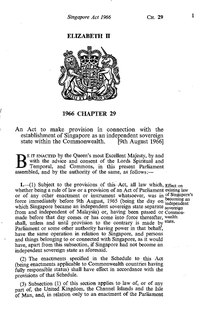| Act of Parliament | |
 | |
| Long title | Act to make provision in connection with the establishment of Singapore as an independent sovereign state within the Commonwealth. |
|---|---|
| Citation | 1966 c. 29 |
| Territorial extent | Singapore United Kingdom |
| Dates | |
| Royal assent | 9 August 1966 |
| Other legislation | |
| Relates to | |
Status: Current legislation | |
| Text of statute as originally enacted | |

The Singapore Act 1966 (c. 29) was an Act passed by the Parliament of the United Kingdom that admitted Singapore as a sovereign state into the Commonwealth of Nations with retroactive effect from 9 August 1965, being the date on which Singapore became a sovereign state within the Commonwealth.